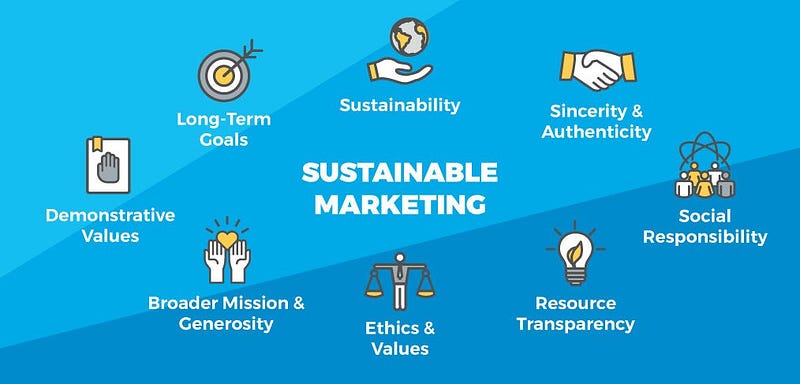Sustainable Marketing: How Brands are Going Green

In an era where environmental concerns are at the forefront of global discourse, sustainable marketing has emerged as a vital strategy for brands aiming to resonate with eco-conscious consumers. As more people prioritize sustainability in their purchasing decisions, companies are increasingly adopting green marketing practices to not only reduce their environmental footprint but also to build stronger connections with their audience. This blog explores how brands are going green and the benefits of sustainable marketing.

What is Sustainable Marketing?
Sustainable marketing is the practice of promoting products and services in a way that considers their environmental, social, and economic impact. It involves adopting eco-friendly practices throughout the entire lifecycle of a product, from sourcing raw materials to production, packaging, and distribution. Sustainable marketing not only focuses on reducing negative environmental impacts but also emphasizes ethical practices and social responsibility.
Key Strategies for Sustainable Marketing
- Eco-Friendly Products and Packaging
- Sustainable Materials: Many brands are switching to sustainable materials for their products and packaging. This includes using recycled or biodegradable materials, reducing plastic use, and opting for renewable resources.
- Minimalist Packaging: Brands are adopting minimalist packaging designs to reduce waste. This involves using less material, eliminating unnecessary components, and designing for recyclability.
2. Transparent Supply Chains
- Ethical Sourcing: Consumers are increasingly concerned about where their products come from. Brands are focusing on ethical sourcing of materials, ensuring that they are obtained responsibly and sustainably.
- Supply Chain Transparency: Providing transparency in the supply chain builds trust with consumers. Brands are using technology to trace the origins of their products and share this information with their customers.
3. Green Certifications and Labels
- Third-Party Certifications: Obtaining certifications from recognized third-party organizations, such as Fair Trade, USDA Organic, or Energy Star, helps validate a brand’s sustainability claims.
- Eco-Labels: Eco-labels on products indicate their environmental benefits, making it easier for consumers to make informed choices.
4. Sustainable Business Practices
- Energy Efficiency: Companies are investing in energy-efficient technologies and renewable energy sources to reduce their carbon footprint.
- Waste Reduction: Implementing waste reduction practices, such as recycling programs and zero-waste initiatives, helps minimize the environmental impact of business operations.
5. Cause-Related Marketing
- Supporting Environmental Causes: Partnering with environmental organizations and supporting causes related to sustainability can enhance a brand’s image and appeal to eco-conscious consumers.
- Corporate Social Responsibility (CSR): Integrating sustainability into a company’s CSR initiatives demonstrates a commitment to making a positive impact on society and the environment.
Benefits of Sustainable Marketing
- Brand Loyalty and Trust
- Consumer Trust: Transparency and ethical practices build trust with consumers, leading to increased brand loyalty.
- Positive Reputation: Brands that prioritize sustainability are viewed more favorably by consumers, enhancing their reputation and credibility.
2. Competitive Advantage
- Market Differentiation: Sustainable practices differentiate a brand from competitors, making it more attractive to consumers who value environmental responsibility.
- Innovation: Embracing sustainability drives innovation, leading to the development of new, eco-friendly products and services.
3. Long-Term Cost Savings
- Resource Efficiency: Sustainable practices often lead to cost savings through more efficient use of resources, reduced waste, and lower energy consumption.
- Regulatory Compliance: Proactively adopting sustainable practices can help brands stay ahead of regulations and avoid potential fines or penalties.
My View on Sustainable Marketing
In my view, sustainable marketing is not just a trend but a necessary evolution in how brands operate. As environmental awareness continues to grow, brands that fail to adopt sustainable practices risk falling behind. By prioritizing sustainability, companies can not only reduce their environmental impact but also build stronger, more meaningful connections with their consumers. The shift towards green marketing is a win-win for both businesses and the planet, driving innovation, fostering loyalty, and ensuring long-term success.
Stay tuned for the next blog in our 80-day marketing series, where we’ll delve into the world of augmented reality and its impact on consumer engagement.
Keep learning and stay curious!
